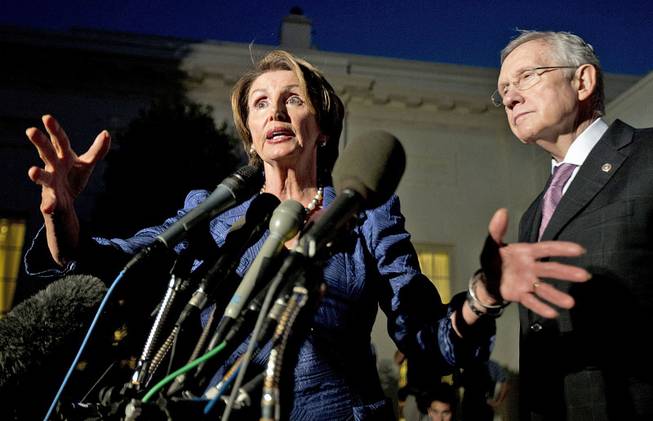
ASSOCIATED PRESS
House Minority Leader Rep. Nancy Pelosi, D-Calif., left, with Senate Majority Leader Sen. Harry Reid, D-Nev., speaks to reporters following a meeting with President Barack Obama and the Republican leadership at the White House in Washington, Wednesday, Oct. 2, 2013.
Thursday, March 20, 2014 | 5:14 p.m.
WASHINGTON — A defiant House Democratic leader Nancy Pelosi declared firmly Thursday that the health care law looms as a political winner for her party this fall, despite ceaseless Republican attacks and palpable nervousness among some of her rank and file who fear their re-election may be in jeopardy because of it.
"We just couldn't be prouder" of the legislation, Pelosi told a news conference where she said the law already has resulted in "better coverage, more affordable, better quality" insurance for nearly 12 million people.
The California Democrat's appearance was timed for the fourth anniversary of the bill's signing by President Barack Obama on March 23, 2010, an occurrence that few other congressional Democrats seem inclined to herald at a time when party strategists seek a strategy to blunt criticism from Republicans and their allies.
The first test of their strategy ended inauspiciously for Democrats in Florida recently, where Republicans won a special election for a House seat after a costly campaign in which the health care law played a heavy role in television advertising.
Pelosi has said the defeat was due more to the make-up of a district long in Republican hands. Other Democrats speaking privately concede the health care law played a role. Opinion surveys indicate the public generally wants to improve the law rather than repeal it, and party strategists are urging lawmakers to take credit for its benefits at the same time they emphasize their desire to change portions of it.
Some Republicans seemed delighted that Pelosi had chosen to trumpet an issue the GOP seeks to put front and center in the campaign. In remarks released even before she spoke, Senate Republican leader Mitch McConnell of Kentucky said, "Obamacare has led to higher premiums, fewer choices and enormous complications even for people who already had insurance. It's forced painful choices for people who could barely get by as it was."
That's not how Pelosi described the law, which passed while she was serving as speaker of the House during Obama's first two years in office.
Asked whether the law figured to be a political winner or a loser in a competitive race for the House, Pelosi said, "I believe that it's a winner." She insisted it be referred to as the Affordable Care Act, its formal title, rather than as Obamacare, a label Republicans mockingly came up with but that the president has since embraced.
More generally, she said, "This isn't about politics. This is about the health of America. ... Just because people say, I don't want to repeal it, but I do want to fix it, doesn't mean they're walking away from it."
She spoke as a public opinion survey by the Pew Research Center for the People and the Press found that 53 percent of the public disapproves of the law, while 41 percent approves of it. More than half the opponents say they want elected officials to make it work as well as possible, including 60 percent of those who are political independents.
House Democrats must gain 17 seats to win a majority next fall. It looms as a very steep challenge in view of the traditional midterm headwinds facing a party in control of the White House and a generally sour public mood, now compounded by controversy surrounding the health care law.
Pelosi accused House Republicans of wasting time by arranging 51 votes to repeal or neutralize the law, and conceded that it is challenging for Democrats to counter attacks financed by "unlimited, undisclosed special interest money."
House Republicans currently are holding private discussions about whether to offer any sort of alternative health care law — more than three years after running on a promise to "repeal and replace" the law Obama signed.
Pelosi said they will have difficulty producing a plan that lowers costs and assures coverage of pre-existing conditions unless they require everyone to purchase insurance — the very provision opponents most often cite as objectionable in the current law.
"When Massachusetts first tried to do the pre-exiting conditions without the mandate, the premiums went through the roof," she said, referring to a law designed to bring universal coverage to one state.
In her comments, Pelosi seemed intent on providing a model for other Democrats to follow in making the case for the law.
She said it assures coverage regardless of pre-existing conditions, permits children to stay on their parents' policy until age 26, slowed premium increases and expanded drug coverage under Medicare, enabled millions of lower-income Americans to gain coverage under Medicaid, and resulted in millions of dollars in rebates to customers from insurance companies that were paying less than 80 percent of their revenue directly to patient care.
She said that more than 10 million and "maybe closer to 12 million people" already have better and more accessible coverage, counting young adult-aged children on their parents' plans; several million who have signed up through HealthCare.gov and separate state-run websites; and lower-income Americans covered through an expansion of Medicaid.

Join the Discussion:
Check this out for a full explanation of our conversion to the LiveFyre commenting system and instructions on how to sign up for an account.
Full comments policy